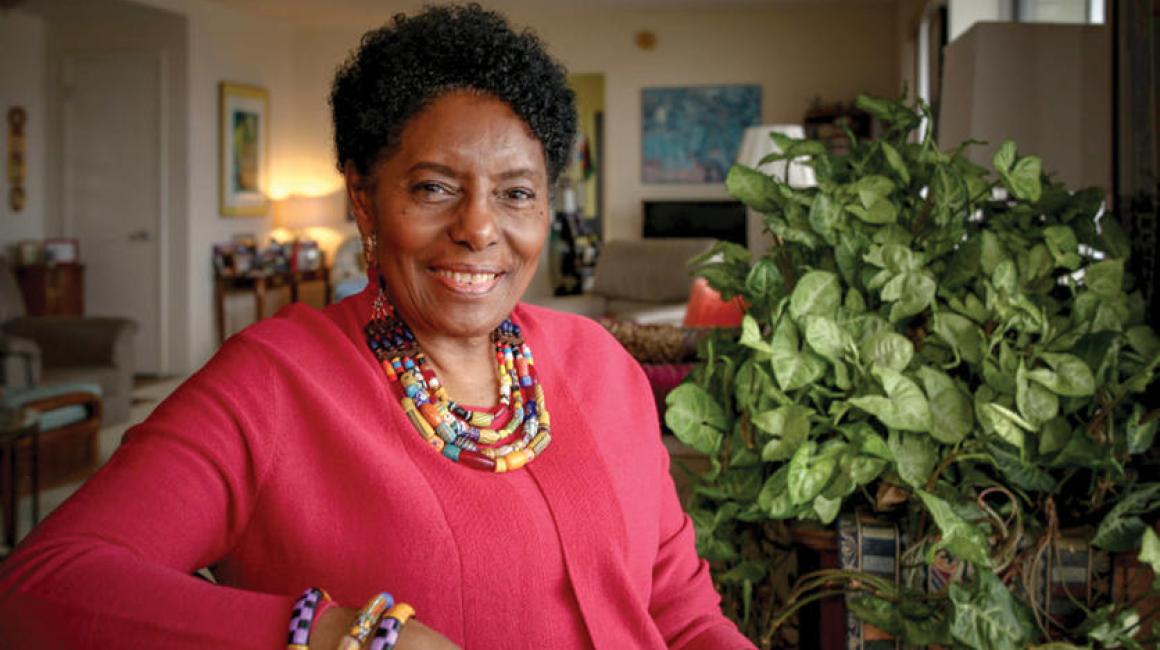
Activism.
It’s the ability to see the need for change and justice for a community, people, or the world at-large and with determination and grit, you do as the first three letters of the word suggest: A-C-T.
Activism is synonymous with Gloria House, professor emerita of African and African American studies and professor emerita of humanities. But it’s also the very quality that isn’t typically associated with a poet — until now. Dr. House is the recent recipient of the 2019 Kresge Eminent Artist Award, which is given to a person who has made a distinguished contribution to the community and arts and comes with a $50,000 prize. House joins a group of past recipients that includes trumpeter Marcus Belgrave, artist Charles McGee and Detroit Poet Laureate Naomi Long-Madgett.
“My work is so clearly political…this award came as a total surprise and it felt as if I was being swept up on a wave of grace,” Dr. House said.
House formerly worked as a field secretary in the Student Non-Violent Coordinating Committee (SNCC). She drafted SNCC’s statement against the Vietnam War, the first public opposition to the war to be issued by a civil rights organization. By means of her activism, House has also helped register people to vote.
"I spoke on the phone with Dr. House, and it felt as though I had dialed the direct line to poetry. Her voice hadn’t changed — it was still the soft, inviting and sweet tone that I remember from my days in her classroom."
It’s fitting that she was my professor for African American Literature, a course in which I was introduced to the voices of African American novelists, journalists, activists, and poets. Of course, at the time I didn’t know that Dr. House was and remains an exact reflection of the various people I met through the pages of the course textbook (that I still have in my possession).
Eventually, I learned that my beloved professor was a published poet, as I saw her many times reading her poetry before large audiences at the Charles H. Wright Museum of African American History in Detroit.
But on the phone that day, Dr. House revealed something I wasn’t prepared to hear.
“Leah,” she said, “it wasn’t until very recently that I was prepared to claim myself as poet.”
Redefining the Poet
Dr. House was in the fourth grade when she first felt pulled to the “sing-song-y” poetry that she remembers being taught in school. She liked the idea that you could work with language and make words into rhythmic patterns.
She started writing her own poems around age nine, and kept her poetry in a personal folder. Eventually, she shared the folder with Dudley Randall, poet and founder of the publishing company Broadside Press. Randall had an inkling of Dr. House’s knack for poetry.
“I gave him my folder that had followed me from undergrad years, grad school, down South,” she remembered. “And when he returned it to me, he had put together a collection of my poems and asked me to proof it.” This became her first book of poetry, BloodRiver, published in 1983.
Unknown to Dr. House, Randall also had shared her writings with the iconic poet Gwendolyn Brooks who said of House, upon reading her work, “This is a poet.”
House continued to write — and publish. Her poetry collections include: Rainrituals (1989), Shrines (2003) and Medicine (2017), all of which are authored under her chosen African name Aneb Kgositsile.
"I’ve heard museum members and professors refer to Dr. House as “Mother Aneb” or just “Aneb.” I knew there had to be some significance attached to this name, as I’ve come to know Dr. House as being a woman who does even the smallest things with purpose."
“Kgositsile is the name of a friend of mine who was a poet laureate of South Africa,” she said. “My father wanted to name me Annabelle, so Aneb is a contraction of that, and it’s also the name of a Somali sister and friend of Kgositsile.”
A reflective pause ensued on the phone as I took in her response and her commitment to the continent of Africa — and in particular, West Africa.
Still, the books of poetry and the robust African name weren’t enough for Dr. House to call herself a poet.
“I still didn’t claim it easily,” she said.
Then, the juxtaposition happened.
Dr. House explained that in Western culture the conventional image of a poet is someone who writes in solidarity and is not concerned about being “caught in community,” and certainly isn’t political.
But it was the recent reading of the role of a griot in African society that sparked something in Dr. House. Of course, she was not new to griots and their ability to recant stories and be historians.
“They had social functions, and this required them to be very much in the mix of community. I’m an artist in that sense,” she said — and I’m convinced she was smiling widely on the other end of the phone.
“A lot of my poems are celebrations of ancestors, heroes; and many poems come out of some major struggle in the community. So, I’m feeling OK with claiming it now, and then the award came and affirmed that.”
Dr. House is the 11th winner of this award from the Kresge Foundation, and with this title honoring her body of work, Dr. House can now fully step into the newly discovered meaning of “poet” and own it — as she has done all these years.
-Written by Leah Olajide ('11 B.A.)
-Professor Emerita Gloria House photo by Karen F. Sanders, courtesy of The Kresge Foundation


